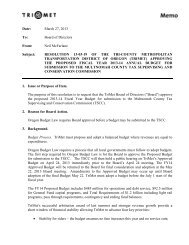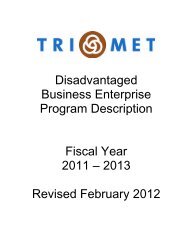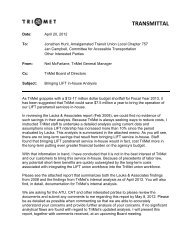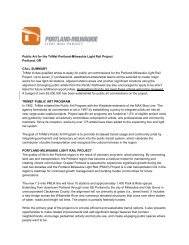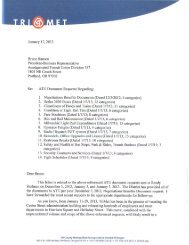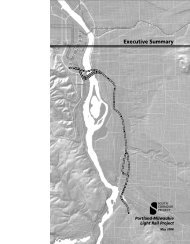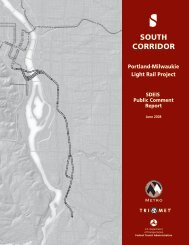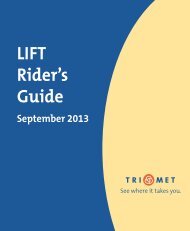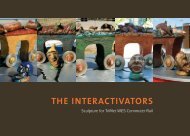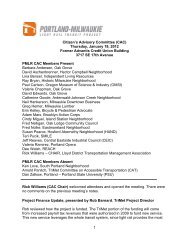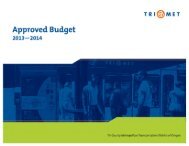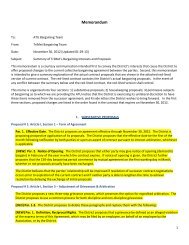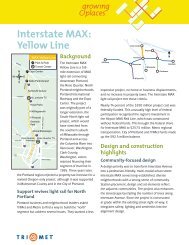06-01-2011 UP-016-11 (ULP # 1) ATU Post-Hearing Brief - TriMet
06-01-2011 UP-016-11 (ULP # 1) ATU Post-Hearing Brief - TriMet
06-01-2011 UP-016-11 (ULP # 1) ATU Post-Hearing Brief - TriMet
- No tags were found...
Create successful ePaper yourself
Turn your PDF publications into a flip-book with our unique Google optimized e-Paper software.
1<br />
J<br />
4<br />
Naomi Loo<br />
Tedesco Law Group<br />
14183 Taylor's Crest Lane<br />
Lake Oswego, OR 97035<br />
866-697-6<strong>01</strong>5 ext.704<br />
FAX: 503-210-9847<br />
naomi@.miketlaw.com<br />
Attorneys for Complainant<br />
6<br />
7<br />
8<br />
BEFORE THE EMPLOYMENT RELATIONS BOARD<br />
OF THE STATE OF OREGON<br />
IU<br />
<strong>11</strong><br />
12<br />
IJ<br />
14<br />
15<br />
lo<br />
AMALGAMATED TRANSIT UNION,<br />
DIVISION 757,<br />
Complainant,<br />
V.<br />
TRI-COLINTY METROPOLITAN<br />
TRANSPORTATION DISTzuCT OF OREGON,<br />
Respondent.<br />
Case No. <strong>UP</strong>-<strong>01</strong>6-l I<br />
COMPLAINANT' S POST-HEARING<br />
BzuEF<br />
17<br />
18<br />
1q<br />
I. PROCEDURAL HISTORY<br />
20<br />
21<br />
22<br />
ZJ<br />
z4<br />
25<br />
26<br />
27<br />
28<br />
29<br />
ATll filed this unfair labor practice complaint on August <strong>11</strong>,2070, alleging that <strong>TriMet</strong><br />
had bargained in bad faith in violation of ORS 243.672(1)(e) by submitting new issues in its<br />
post-impasse final offer. As a result of prehearing proceedings, the entire Board heard this case<br />
in an expedited process on May 18, 2<strong>01</strong>1. At the close of that hearing, the Board requested<br />
follow-up briefing on certain limited issues.<br />
II. FACTUAL BACKGROUND<br />
Other than as specifically noted below, the Union will rely on its prior analysis of the<br />
factual background, contained in its May 9.2<strong>01</strong>1, Prehearing <strong>Brief</strong>, pages 2-8.<br />
1 _ COMPLAINANT'S POST HEARING BRIEF
III. DISCUSSION<br />
The Board requested that the parties brief the following issues: 1) contrast <strong>TriMet</strong>'s Final<br />
Offer with its November 20,2009 proposal; 2) address whether communications between Fred<br />
Hansen and Ron Heintzman afler the second and final bargair-ring session constituted bargaining;<br />
3) if communications between Hansen and Heintzman constituted bargaining, discuss whether<br />
<strong>TriMet</strong>'s final offer logically evolved from any of those discussions; and 4) discuss the<br />
appropriate remedy. Each of these questions will be discussed in turn.<br />
A. <strong>TriMet</strong>'s Proposal versus <strong>TriMet</strong>'s Final Offer<br />
The Union dedicated a good deal of its Prehearing <strong>Brief</strong> and its evidence to a comparison<br />
of <strong>TriMet</strong>'s proposal and its final offer. For efficiency's sake. rather than repeating its arguments<br />
here, the Union refers the Board to its exhibit 33 and pages 8 and <strong>11</strong>-16 of its Prehearing <strong>Brief</strong>.<br />
In addition. the Union would like to address the concepthat portions of <strong>TriMet</strong>'s final<br />
offer constitute mere "housecleaning." None of the changes outlined in the Union's charls, at its<br />
exhibit 33, constitute "housecleaning" items. Rather, each of those issues is a substantive change<br />
to a term or condition of employment for <strong>ATU</strong> members. The Union concedes that some changes<br />
in <strong>TriMet</strong>'s final offer do constitute "housecleaning," such as renumbering paragraphs. However,<br />
none of those "housecleaning" items were included in the Union's charts at exhibit 33, and the<br />
Union likewise did not raise those changes as issues to be considered by this Board.<br />
Another question that arose at the hearing is whether a party's final offer can logically<br />
evolve from the other party's proposal(s). The Union does not believe that such reasoning would<br />
be consistent with the Board's interpretation of good-faith bargaining under the PECBA,<br />
parlicularly in the context of a strike-prohibited unit. As discussed in the Union's prehearing<br />
brief, the pulpose of the requirementhat a final offer logically evolve from a party's proposal(s)<br />
2 - COMPLAINANT'S POST HEARING BRIEF
1<br />
is so that parties "put their proposal on the table in hopes of generating meaningful bargaining<br />
z<br />
<br />
5<br />
6<br />
7<br />
B<br />
10<br />
<strong>11</strong><br />
12<br />
1<br />
41<br />
15<br />
to<br />
that will naffow the disagreement and lead to a settlement." Amalgctmated Transit Union,<br />
Division 757 v. Rogue Valley Transportation Districf, Case No. <strong>UP</strong>-80 -95, 16 PECBR 707 , 710<br />
(1996). In other words, proposals must be "subjected to the crucible of the PECBA's dispute<br />
resolution process, if that process is to have any efficacy." Blue Mountain Faculty<br />
Association/Oregon Education Association v. Blue Mountain CommuniQ College, Case No. <strong>UP</strong>-<br />
22-05,21 PECBR 673 (2007)<br />
Certainly one party can base a counter-proposal on the other parly's proposal, but this<br />
must be done at the bargaining table so as to give the other party a meaningful chance to<br />
respond. Indeed, such movement by one party towards the other party's bargaining position<br />
would likely move the parties closer to an overall agreement. Such compromise is meaningless i<br />
it is done after the parties have reached impasse-it denies the other pafty a chance to evaluate<br />
and possibly change its own bargaining position based on the other party's movement. That is,<br />
17<br />
18<br />
1q<br />
20<br />
21<br />
basing a proposal on the other party's proposal would certainly constitute good faith bargaining<br />
while the parties are still in the midst of the bargaining process; but to do so after bargaining has<br />
ceased, with no prior hint that a party would have been willing to make such movement, is<br />
meaningless. Not orily does it deny the other party a meaningful chance to respond, but it also<br />
puts the party in a better position going into interest arbitration-if it's proposal is more<br />
ta<br />
24<br />
25<br />
26<br />
27<br />
28<br />
reasonable, the interest arbitrator is more likely to selecthat party's proposal.<br />
In Southern Oregon Bargaining Council/Rogue River Education Associarion v. Rogue<br />
River School District, Case No. <strong>UP</strong>-62-09,23 PECBR 767 (2<strong>01</strong>0), Chair Gamson concurring,<br />
reconsid.23 PECBR 878 (2<strong>01</strong>0), the employer made a proposal at mediation wl-rich the Board<br />
concluded logically evolved frorn the parties' prior discussions because it "was directly<br />
ZJ<br />
3 - COMPLAINANT'S POST HEAzuNG BRIEF
I<br />
1<br />
5<br />
o<br />
7<br />
8<br />
I<br />
10<br />
<strong>11</strong><br />
12<br />
responsive to the Association position that the partie should bargain about" this particular issue. I<br />
In other words, the Board, without explicitly stating it, reasoned that one party's proposal may<br />
logically evolve from the other party's prior proposals. However, it is important to note that<br />
Rogue River was decided in the context of mediation, where the parties are still engaged in the<br />
bargaining process. That is, both parties still have the opportunity to meaningfully respond<br />
I<br />
I I<br />
I<br />
I<br />
I<br />
to the I<br />
other's proposals. Here, even if any of <strong>TriMet</strong>'s Final Offer were found to have logically evolvedl<br />
from <strong>ATU</strong>'s proposal, <strong>TriMet</strong> made no effort to put those proposals on the table while the partiesl<br />
were still bargaining.<br />
The distinction between the mediation and the interest arbitration context is important<br />
'l in I<br />
at least two ways. First, in the context of interest arbitration, parties generally do not continue to II<br />
I<br />
IJ<br />
It<br />
IJ<br />
to<br />
17<br />
18<br />
19<br />
20<br />
21<br />
bargain after submission of their final offers, whereas in strike-permitted units, parties often<br />
continue to bargain after declaring impasse.<br />
In other words, the final offer is not merely another<br />
II<br />
step in the bargaining process, like mediation-rather, final offers are submitted to an arbitrator I as the party's last position with the intent that this exact language will be included in the labor I agreement. There is no expectation that bargaining rvill continue at this stage in the process I<br />
I<br />
Second, as already mentioned, the arbitrator in an interest arbitration selects one party's I<br />
final offer in its entirety. Therefore, if a party is allowed to have a proposal in its final offer that II<br />
I<br />
I<br />
22<br />
has not been "subjected to the crucible" of the bargaining process, the other party may have a<br />
I<br />
ZJ<br />
24<br />
ZJ<br />
zo<br />
term or condition of employment imposed upon it which it never had the opportunity to bargain. I<br />
Such a result is contrary to the principals of the PECBA.<br />
I<br />
For these reasons, <strong>TriMet</strong>'s Final Offer must have logically evolved from its own<br />
I I<br />
27<br />
28<br />
ZJ<br />
proposal to the Union.<br />
4 _ COMPLAINAN'I''S POST HEAzuNG BzuEF<br />
I<br />
I<br />
I<br />
I<br />
I III
1<br />
B. Interim Communications Between Hansen and Heintzman<br />
In its Prehearing <strong>Brief</strong>, pages 18-20, the Union discussed in detail why the interim<br />
4<br />
6<br />
7<br />
8<br />
10<br />
<strong>11</strong><br />
12<br />
communications between Hansen and Heintzman did not constitute bargaining. Suffice it to say,<br />
not only was Heintzman not the Union's bargaining representative, he was not even formally<br />
affiliated with the local at the relevant time and in fact was domiciled in Washington, D.C.-<br />
facts of which Hansen was certainly aware. Hansen was also aware of the parties' ground rules,<br />
that the Union was still operating under those rules, and that several of those rules clearly<br />
indicate that the interim communications between Heintzman and Hansen were not bargaining.<br />
It is worth emphasizing that there was nothing stopping <strong>TriMet</strong> from submitting a formal<br />
proposal at the bargaining table, as required by the ground rules. Hansen admitted on cross<br />
examination that he never requested a formal bargaining session after the December 3rd session<br />
4A<br />
tc<br />
16<br />
17<br />
18<br />
10<br />
20<br />
21<br />
zz<br />
was cancelled, even though it was <strong>TriMet</strong>, and not the Union, who wished to make substantive<br />
changes to the parties' agreement. Even though Hansen's testimony on the subject was evasive,<br />
he certainly was aware that <strong>TriMet</strong> had to make formal bargaining proposals at the bargaining<br />
table, where proposed language could be explained to the entire bargaining team.<br />
C. Logical Evolution from Interim Communications<br />
The Union previously addressed the question of whether any portion of <strong>TriMet</strong>'s Final<br />
Offer logically evolved from any of Hansen's communications with Heintzman at pages 2022<br />
ZJ<br />
24<br />
25<br />
26<br />
of its Prehearing <strong>Brief</strong>. In the hopes of further illustrating that <strong>TriMet</strong>'s Final Offer does not<br />
logically evolve from those interim communications, the same information is presented below in<br />
chart form.<br />
27<br />
28<br />
29<br />
5 - COMPLAINANT'S POST HEARING BRIEF
Hansen/Fleintzman<br />
Communications<br />
<strong>TriMet</strong> Final Offer<br />
NONE<br />
.ILRC meetinss.<br />
10<br />
<strong>11</strong><br />
Article I. Section 9. Parasranhs 1.2.3. and 5 (Active Emplovee Health Benefits<br />
Summarv & Summary Plan Descriptions):<br />
Hansen/fleintzman<br />
Communications<br />
<strong>TriMet</strong> Final Offer<br />
13<br />
14<br />
IJ<br />
to<br />
17<br />
1B<br />
21<br />
27<br />
29<br />
Adopt the Lane<br />
Transit District Plan<br />
(C. Ex.22;<br />
Prehearing <strong>Brief</strong> at<br />
20, lines 10-29).<br />
"ourgoal... isthat<br />
the health care plan<br />
design...be<br />
consistent for both<br />
union and<br />
management<br />
employees" (C. Ex.<br />
25;Prehearing <strong>Brief</strong><br />
at2T,lines <strong>11</strong>-21);<br />
(C.Ex.26;<br />
Prehearing <strong>Brief</strong> at<br />
) 1J)\<br />
P Retains Regence, but changes plans/benefits, outof-pocket<br />
expenses, and employee contributions.<br />
F Retains Kaiser, but changes plans/benefits and<br />
out-of-pocket expenses.<br />
) Employees retiring after 4l7ll2 will receive<br />
coverage for 3 years or until Medicare-eligible,<br />
whichever occurs first. Once Medicare eligible,<br />
<strong>TriMet</strong> will provide $500 per month per eligible<br />
person, as opposed to reimbursing for actual<br />
costs.<br />
} Employees hired after 4l1ll1, once vested and<br />
retired, will receivd a sliding scale contribution<br />
from <strong>TriMet</strong> for health and welfare benefits for<br />
the employee and spouse based on years of<br />
service. The sliding scale contribution is equal to<br />
4Yo of fixed contribution upon retirement<br />
multiplied by years in service.<br />
) <strong>TriMet</strong> will pay <strong>ATU</strong> only 5500 per month for the<br />
benefits coordinator (versus current $ 1400 per<br />
month). <strong>TriMet</strong> will have the right to audit <strong>ATU</strong>'s<br />
usage of the funds and cease $500 monthly<br />
payment should <strong>TriMet</strong> find that <strong>ATU</strong> misused<br />
funds.<br />
i <strong>TriMet</strong> will cap its annual contribution to the<br />
<strong>ATU</strong>-operated employee assistance program at<br />
6 - COMPLAINANT'S POST HEAzuNG BRIEF
565,000, versus a $2,000 annual increase to<br />
$67,000, $69,000, and $71,000 under current<br />
CBA.<br />
F Adds domestic partners to retiree coverage and<br />
sick leave.<br />
Article I. Section 19, Paragraph 4 (Recreation Trust Fund):<br />
Hansen/fleintzman<br />
Communications<br />
<strong>TriMet</strong> Final Offer<br />
<strong>TriMet</strong> will cap its annual contribution to the<br />
Recreation Trust Fund to $55,000, versus an annual<br />
NONE ; b2,000 increase to $57,000, $59,000, and $61,000<br />
under the current CBA.<br />
:<br />
Hansen/Heintzman<br />
Communications<br />
|{ONE/UNCLEAR<br />
F Wage freeze (C. Ex.<br />
22;Prehearing <strong>Brief</strong><br />
ar2l. lines l-10).<br />
<strong>TriMet</strong> Final Offer<br />
Deletes minimum progression pay schedule for new<br />
rures.<br />
Retain COLA with a minimum of yyo and a<br />
maximum of 5oh.<br />
periodic pay'<br />
adjustments during<br />
the term of the new<br />
WWA in lieu of any<br />
COLA's" (C.E.x.27,<br />
par. 3).<br />
Pension Plan and Permanent Disability Agreement, Section I, Paragraphs 2-17:<br />
Hansen/Heintzman<br />
Communications<br />
<strong>TriMet</strong> Final Offer<br />
.,. . . all new union ) Deletes references to "full" retirement benefits.<br />
7 - COMPLAINANT'S POST HEARING BRIEF
employees, hired after a<br />
certain date, to be agreed<br />
upon, will be eligible for<br />
a <strong>TriMet</strong> Defined<br />
Contribution Plan." (C.<br />
Ex.27.par.2)<br />
F A 3O-year employee must be at least 55 years old<br />
to retire; in the past, no minimum age so long as<br />
employee had 30 years of service.<br />
i Adds the requirementhat a mini-run operator<br />
have a minimum of 2 years of service as a fulltime<br />
regular operator before becoming eligible for<br />
full time retirement benefits.<br />
). Changes retirement pay for current retirees to<br />
annual COLA adjustment pegged to national CPI-<br />
W but not to exceed 7o/o per year.<br />
10<br />
<strong>11</strong><br />
12<br />
14<br />
15<br />
16<br />
17<br />
18<br />
19<br />
21<br />
22<br />
> $42.00 per month per year served basis will only<br />
apply to active employees hired before 4lIl12.<br />
> All employees who retire after 4lllll wili receive<br />
retirement pay equal to annual COLA adjustment<br />
pegged to 90oh of national CPI-W but not to<br />
exceed 7o/operyear.<br />
) Active employees hired on or after 4l1ll2 will be<br />
' eligible for and participate in a Defined<br />
Contribution Plan that non-union <strong>TriMet</strong><br />
employees participate in (versus a pension plan,<br />
which is a Defined Benefit Plan).<br />
As demonstrated by these charts and the Union's Prehearing <strong>Brief</strong>, the portions of<br />
<strong>TriMet</strong>'s Final Offer outlined above are either completely absent from the interim<br />
communications, discussed in a vague and general tnanner, or discussed in a way that was not<br />
reasonably comprehended within <strong>TriMet</strong>'s final offer.<br />
D. Remedy<br />
Although the Union briefly discussed the issue of remedy in its Prehearing <strong>Brief</strong>, at p<br />
24-25, some elaboration is in order. There does not appear to be any dispute that the Board I<br />
at the entire Final Offer and determines whether all aspects of the Final Offer logically evolve<br />
from <strong>TriMet</strong>'s proposal. In other words, if any portion of <strong>TriMet</strong>'s Final Offer does not logically<br />
evolve from its proposal, the remedy would be to take the parties back to the submission of their<br />
final offers. <strong>TriMet</strong> should be ordered to revise its Final Offer to include only those items that" in<br />
8 _ COMPLAINANT'S POST HEARING BRIEF
1<br />
2<br />
the Board's opinion, underwenthe "crucible of bargaining." It seems most appropriate for the<br />
Board to be explicit in its opinion about which, if any, of <strong>TriMet</strong>'s Final Offer items logically<br />
evolved from bargaining, and then order <strong>TriMet</strong> to change those items and resubmit its Final<br />
5<br />
Offer accordingly.<br />
IV. CONCLUSION<br />
7<br />
8<br />
o<br />
10<br />
For the reasons set forth above, <strong>ATU</strong> is seeking an order that <strong>TriMet</strong> withdraw its final<br />
offer and replace it with one that logically evolves from its November 20,'2009 proposal, and all<br />
other relief the Board deems appropriate.<br />
<strong>11</strong><br />
12<br />
13<br />
DATED tiris i5* dav of June. 2<strong>01</strong>1.<br />
14<br />
15<br />
to<br />
17<br />
1R<br />
19<br />
20<br />
21<br />
Naomi Loo, OSM',J o. 08122<br />
Tedesco Law Gfoup<br />
14183 Taylor's Crest Lane<br />
Lake Oswego, OR 97035<br />
866-697-6<strong>01</strong>5 ext. 704<br />
FAX: 503-210-9847<br />
naomi@miketlaw.com<br />
Attorneys for Complainant<br />
22<br />
z5<br />
24<br />
25<br />
26<br />
27<br />
28<br />
ZY<br />
9 - COMPLAINANT'S POST HEARING BzuEF



